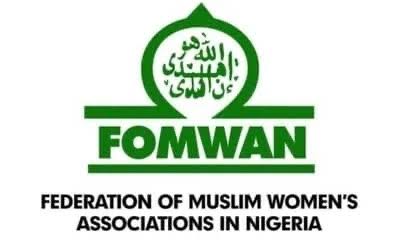News Investigators/ The Federation of Muslim Women’s Associations in Nigeria (FOMWAN) has reaffirmed its national leadership role in faith-based community development, women empowerment, and climate action.
This is as the association marked its 40th anniversary with a National Conference in Kaduna.
The conference has as theme ‘Empowering Muslim Women in the Face of Climate Change: Building Resilience, Sustainability and Community Development’.
The event brought together dignitaries, policy makers, religious leaders, and development stakeholders from across the country and beyond.
In his remarks, Vice-President Kashim Shattima
lauded FOMWAN for its consistent advocacy and unwavering dedication to women’s advancement, particularly within the Muslim community.
The vice-president, who was represented by the Minister of State for Education, Dr Suwaiba Ahmad, stated that such platforms were vital in reinforcing inclusive governance.
According to him, they also foster a generation of confident female leaders equipped to contribute meaningfully to national development.
He also highlighted the government’s commitment to creating policies that support women’s empowerment, emphasizing that the current administration recognises the strategic role women play in peacebuilding and socio-economic growth.
Mr Shettima also urged the stakeholders to continue to support initiatives like FOMWAN which aligned with national objectives of equity and inclusion, particularly in the education sector.
The Speaker of the House of Representatives, Hon. Tajudeen Abbas, who was also the Chairman of the event, was represented by Prof. Abduljalal Danbaba.
He commended FOMWAN for its consistent efforts in empowering Muslim women and building inclusive, faith rooted communities.
“FOMWAN has contributed immensely to the moral, spiritual, and educational development of Nigerian women,” he said.
Founded in 1985, FOMWAN now boasts of chapters in all 36 states and the FCT, with a presence in over 600 local government areas and more than 80,000 registered members.
It remains one of Nigeria’s most organized and influential Muslim women’s NGOs.
In her remarks , Nigeria’s First Lady, Sen. Oluremi Tinubu,who was represented at the event by Hajiya Fatima Tajudeen-Abbas, praised FOMWAN’s four-decade journey of service.
“FOMWAN has shaped the lives of countless women and families through education, health outreach, and spiritual guidance,” she stated.
Mrs Tinubu recalled her personal association with FOMWAN during her tenure as the Lagos State First Lady between 1999 and 2007.
She described the association as “a beacon of hope and leadership,” extolling its alignment with the Renewed Hope Agenda by investing in women’s empowerment and community development.
In his remarks, Gov. Uba Sani, represented by his Deputy, Dr Hadiza Balarabe, welcomed the delegates while describing the event as a celebration of “forty years of faith, perseverance, and impact.”
He praised FOMWAN’s critical role in driving girl-child education, livelihood empowerment, and healthcare interventions.
Sani said, “Our administration recognizes the transformative power of faith based organizations.
“In Kaduna, we continue to partner with groups like FOMWAN to build resilient communities and foster peace, particularly in the face of emerging challenges like climate change.”
The National Amirah of FOMWAN, Mrs Rafiah Sanni, earlier in her address, said the organisation’s legacy was built on the dedication of Muslim women to improving society through faith, education, and service.
She thanked the stakeholders for their support, describing the event as “more than a milestone it is a tribute to Muslim women’s ambition and resilience.”
Highlighting the association’s key achievements, Sanni said that FOMWAN had established over 3,000 schools nationwide, from daycare to primary level.
According to her ,plans are underway to establish a FOMWAN-owned University as part of its long-term vision to provide holistic education rooted in Islamic and Western knowledge.
“From health outreach to environmental campaigns, we have impacted millions,” she said.
Sanni added that the association’s foundational pillars education, healthcare, Da’awah, and empowerment have shaped its strategic partnerships with both local and international organizations.
She also said FOMWAN was also defending Muslim women’s rights, including its advocacy on hijab usage in schools and its promotion of decent dress codes, without infringing on others’ rights.
The News Agency of Nigeria (NAN) reports that the speakers reflected its constitutional and faith-based approach to women’s dignity and freedom.
The conference, which also featured discussions on climate resilience and environmental stewardship, explored how Muslim women can become catalysts for sustainable change.
Delegates were urged to lead green initiatives and adopt climate friendly practices in their communities.
The delegates at the event also expressed renewed commitment to advancing FOMWAN’s mission into its fifth decade.
“This 40th anniversary is not an end but a new beginning,” said one regional Amirah. “We will continue to serve, educate, and build, in sha Allah,”they said.
FOMWAN’s growing international recognition, its grassroots impact, and its future ambitions including plans for global women’s development fors position it as a model for faith-based, women-led development movements in Africa and beyond.
NAN


